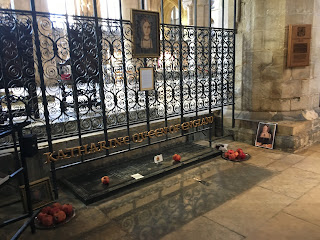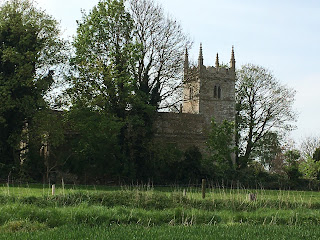THE QUIET WATERS BY
So here I am in Peterborough again. I stop at the front of house and talk to Lesley who works as a volunteer one morning a week. She also does some Cathedral guiding. Here’s the tomb of Katharine of Aragon – not the original, which was trashed by Cromwell’s iconoclasts. It’s a slight enough thing for a Queen. You see the pomegranates which have been left for her? Katharine lived in Granada as a child. In adult life she often wore a pomegranate brooch.
Katharine
was Henry VIII’s first wife. We tend to forget Henry was her second husband. At
the age of sixteen, she’d married his older brother Arthur, the King that never
was. Maybe that ultimately preserved her life for a few more years. Although
she couldn’t produce a male heir for Henry, perhaps there was too much weight
of family tradition to do away with her. Or perhaps she was already ill when
Henry cast her aside. Yet alongside those past tragedies, she had to watch Henry
take a mistress, had her marriage annulled, and suffered exile. When she died of
cancer at Kimbolton in 1536, her inconvenience led to burial in rural Peterborough
rather than London. Did she arrive in the city by road, the coffin jolted
roughly over the cobbles? Or perhaps the last part of her final journey had
more regal dignity, brought in by barge on the Nene, Guinevere at last.
Many, many churches are dedicated to St. Peter, but comparatively few secular places take his name. Some women, perhaps many women, find difficulty in the notion of Peter as being ‘so like us’, as we’re often told – an epitome of masculinity, quick to enthuse and act, the template for universal sin in his denial of Jesus at the crisis. Then of course, as Jesus promised, the redeemed Peter becomes the founder and hero of our Church. The legend has him crucified upside down, head in the dirt, within range of a casual swinging boot. It’s almost a parody of his Lord’s death. What should a woman feel in this very male scenario?
PETERBOROUGH CATHEDRAL
And felt a betraying
knife?
And which of us could
boast
We never harmed
another’s fragile life?
And do the bones of
Katharine shout a vengeance shrill?
And does a Petrine
dedication chill our soul?
The cock has crowed: we
cannot help ourselves.
We weep. We are not whole.
But listen up.
The silence in this
stone will heal our ancient sin.
We stand before a
throne.
The Kingdom’s come,
The gate of heaven’s
unlocked
And we’re let in.
Down the river path to the village of Castor and wonderful St. Kyneburgha’s church. On the way, an extraordinary sight beside Peterborough Rowing Club’s trench – a baby seal, sunning itself on the boards. I almost miss him until Stella, who’s walking the other way, points him out. Apparently the parents were also seen last winter. Where did they come from? Unwanted Christmas presents, maybe?
At the Nene Valley Railway’s ‘Lynch Bridge’, three half-term lads parading themselves, walking along the parapet. I remain resolutely unimpressed. They call after me, and follow me, hunting mischief till I take a route their bikes won’t like.
In Castor a man takes his wheelchair-bound mum for a walk out of a care home. She yells ‘No, no, no’ all the way up the road in a repeated, recognisable musical motif. I feel for him and her. When I pass them at the bus stop, she’s quieter.
In Stocks Lane, the whitened skulls of animals – four or five of them – wedged into a wisteria on the wall. Beloved pets? A country ritual? To scare off intruders?
A lady with her grandson, both carrying cans of cleaner, pass me as I sit outside St. Kyneburgha’s. The little boy is reluctant, kicking up the gravel. ‘We’ll find lots of things to do inside’, Grandma says encouragingly. When I go in a few minutes later they’ve just found a dead bat. As far as the child is concerned, will this count as fun or not?
The
name ‘Castor’ tells you the place is Roman, but underplays the magnificence of
what was once here. This was no mere ‘camp’ or fort. There was a great palace
looking out over the Nene’s flood plain, roughly on the church site. There might have been an exotic mix of people
coming and going: visitors from all over Empire, and indigenous folk come to pay
tribute and picking up foreign habits while they’re there. Here’s a son of
Rome, sharing his thoughts over a pint or in the latrine. Perhaps he’s in
Britain because he was always a bad boy, or maybe he’s a thrill-seeking
adventurer who’ll one day return to a veteran’s plot of Italian soil.
I wrote this, thinking about the fighters on both sides in the Ukraine conflict. God is always on our side whoever we are, but at the moment we view with horror the thought that the Russians prosecuting the war can believe Jesus is their Saviour too. Maybe eventually this Roman was one of the seeds of the Faith in Northamptonshire, despite his braggadocio.
CASTOR’S HILL
Ave amice.
Budge up and give me a
seat.
Bro, I’m just a
squaddie
One of the best.
Home grown
From an insula
On the edge of The
City.
Five floors, screaming
kids and domestics every night.
Garbage everywhere.
I saw a bit of life, I
can tell you.
Now here I am
Hundreds of miles away
Watching these dirty
tribes
Kidding themselves they
got civilisation.
Jesus?
You got me bang to
rights.
Sure, I’m one of His,
No Mithras or Osiris
for this private.
I want something real.
How does it square
With me being a
fighting man
Love and peace n’all?
Let me tell you
something.
These Brits are
animals.
The sword’s the only
thing they understand,
So we put them under
the yoke
For the Emperor and
Rome.
Brothers in Christ?
Me and them?
Not likely.
It’ll never catch on
here.
Not in another two
thousand years.
17 km. Bright and sunny, but cool at 13 deg. 5 hours walking.





Comments
Post a Comment